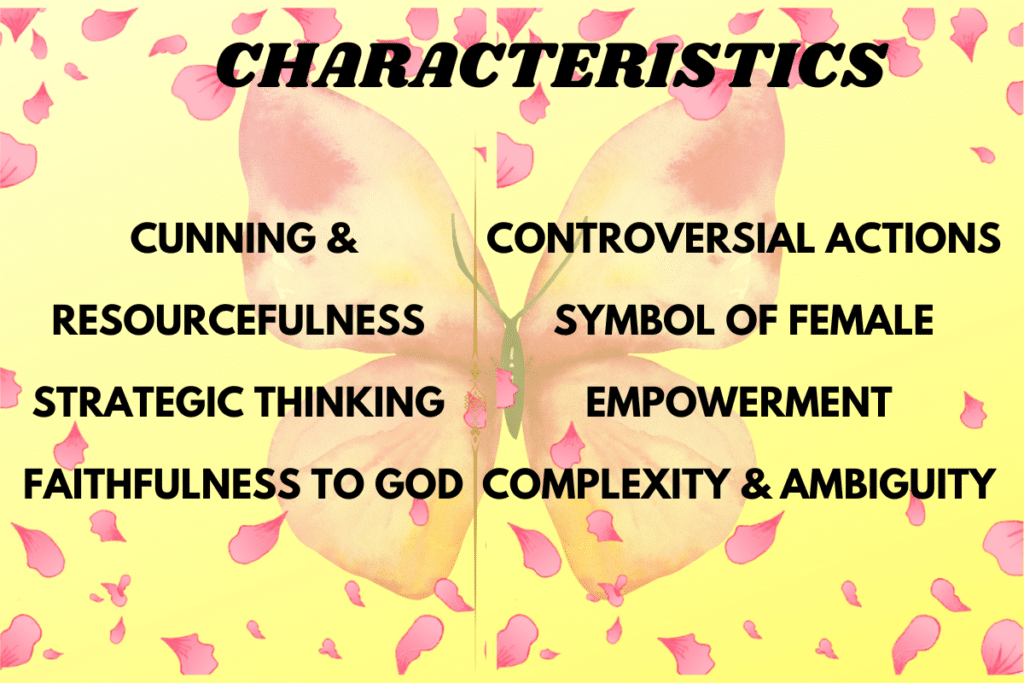JUBILANT JAEL IN THE BIBLE
The name “Jael” is of Hebrew origin and has a few possible meanings:
Mountain Goat One interpretation of the name “Jael” connects it to the Hebrew word “yahal,” which means “mountain goat.” In this context, Jael’s name may evoke images of agility, strength, and sure – footedness.
Wild or Untamed: Another possible meaning of “Jael” is derived from the Hebrew word “ya’el,” which can be translated as “wild” or “untamed.” This interpretation suggests a sense of independence and freedom associated with the name.
Jael, a character from the Book of Judges, is depicted as a heroine who played a crucial role in the Battle of Mount Tabor. She demonstrated qualities of bravery, resourcefulness, hospitality, quick thinking, loyalty, and physical strength when she killed Sisera, the commander of King Jabin’s army, by driving a tent peg through his skull.

Jael’s actions have been interpreted in various ways, with some viewing her as a survivor caught in political circumstances and others highlighting her gender ambiguity, showcasing both masculine and feminine traits in her character.
Background of Jael in the Bible
The Book of Judges depicts a tumultuous period in ancient Israelite history, marked by cycles of disobedience, oppression, and divine deliverance. The Israelites repeatedly turned away from God, leading to subjugation by foreign powers such as the Canaanites under King Jabin.
In this context, Jael in the Bible, a Kenite woman, played a pivotal role in the Israelites’ liberation from Canaanite oppression. Her story highlights the complex interplay of gender, violence, and divine intervention during this chaotic era, where even marginal figures like Jael in the Bible could become unlikely heroes in the struggle for the Israelites’ freedom.
Jael’s Encounter with Sisera
Sisera’s Flight to Jael’s Tent
After the Israelite forces led by Barak defeated the Canaanite army under Sisera’s command, Sisera fled and sought refuge in the tent of Jael, the wife of Heber the Kenite. Jael welcomed Sisera, offering him hospitality and hiding him under a rug.
However, Jael in the Bible then seized the opportunity to kill Sisera, driving a tent peg through his temple while he slept. Jael’s actions, though a violation of the laws of hospitality, were seen as instrumental in the Israelites’ victory over the Canaanites. Her story highlights the complex dynamics of gender, violence, and divine intervention during this tumultuous period in ancient Israel’s history.
Jael’s Deception
According to the biblical narrative, when Sisera, the Canaanite commander, fled and sought refuge in Jael’s tent, she welcomed him and offered him hospitality. Sisera, feeling safe and secure, fell into a deep sleep. Seizing this opportunity, Jael took a tent peg and drove it through Sisera’s temple, killing him.

This act, though a violation of the laws of hospitality, was seen as a pivotal moment in the Israelites’ victory over the Canaanites. Jael’s actions demonstrate her courage, quick thinking, and willingness to take drastic measures to aid her people, even if it meant betraying the trust of her guest.
The Defeat of Sisera
Jael’s decisive action of driving a tent peg through Sisera’s temple while he slept was a strategic and bold move that ended his life and delivered a significant blow to the Canaanite forces. This act of violence, though shocking, was seen as instrumental in the Israelites’ victory over their oppressors.
Jael’s cunning and strength in seizing the opportunity to eliminate Sisera, a powerful commander, showcased her resourcefulness and determination to secure her people’s freedom, even if it meant resorting to extreme measures. Her actions, though morally ambiguous, were pivotal in turning the tide of the battle and securing peace for the Israelites.
The Significance and actions of Jael in the Bible
Jael’s bold and resourceful actions were pivotal in the Israelites’ victory over their oppressors. By seizing the opportunity to subdue Sisera, a powerful commander of the Canaanite army, she delivered a decisive blow that shifted the course of the battle. Jael’s courage, cunning, and willingness to take drastic measures, such as driving a tent peg through Sisera’s temple, showcased her determination to secure freedom for her people.
Her unconventional yet effective tactics exemplified the unexpected ways in which individuals can play a crucial role in achieving victory against formidable foes, highlighting the complex dynamics of warfare and divine intervention in ancient Israel.
Legacy of Jael in the Bible
The story of Jael in the Bible, as recounted in the Book of Judges, serves as a testament to the unexpected ways in which God can work through ordinary individuals to achieve His divine purposes. Despite her humble status as a Kenite woman, Jael in the Bible demonstrated remarkable courage, cunning, and resourcefulness in her pivotal role in the Israelites’ victory over their Canaanite oppressors.
Her decisive action of killing the Canaanite commander Sisera, even through a violation of the laws of hospitality, was seen as a crucial turning point that allowed the Israelites to secure their freedom.The story of Jael in the Bible highlights how God can empower the marginalized and use unconventional means to deliver His people, defying societal expectations and norms.
Lessons from Jael in the Bible
The story of Jael in the Bible offers several valuable lessons for readers:
- Courage in the Face of Adversity: Jael in the Bible demonstrates remarkable courage in confronting a powerful enemy. Her willingness to take decisive action, even when faced with danger, serves as an inspiration to face challenges head-on.
- Resourcefulness and Creativity: Jael’s use of cunning and resourcefulness teaches us the importance of thinking outside the box when tackling obstacles. She employs unconventional methods to achieve her goals, highlighting the value of creativity in problem-solving.
- Faithfulness to God’s Cause: Jael’s actions are depicted as part of God’s plan for delivering the Israelites from oppression. Her unwavering commitment to God’s cause reminds us of the importance of remaining faithful to our beliefs, even in difficult circumstances.
- The Power of Individual Agency: The story of Jael in the Bible emphasizes the impact that individual actions can have on shaping history. Despite her humble background, she plays a pivotal role in the defeat of the Canaanites, illustrating the power of individual agency to effect change.
- Ethical Dilemmas and Moral Ambiguity: Jael’s actions raise complex ethical questions about the use of violence and deception. Her story prompts readers to grapple with the moral ambiguity inherent in human decision-making, encouraging us to consider the consequences of our actions carefully.
- The Role of Divine Providence: The story of Jael in the Bible underscores the belief in divine providence, the idea that God works through human agents to fulfill his purposes. Her actions are portrayed as part of God’s larger plan for delivering his people, reminding us of the presence of divine guidance in our lives.
- Empowerment of Marginalized Voices: Jael in the Bible, as a woman from a marginalized community, challenges traditional gender and social norms by taking matters into her own hands. Her story serves as a reminder of the importance of amplifying marginalized voices and recognizing the contributions of individuals from all walks of life.
Overall, The story of Jael in the Bible teaches us valuable lessons about courage, resourcefulness, faithfulness, and the complexities of moral decision-making. It invites readers to reflect on their own actions and the ways in which they can make a positive impact in the world around them.
Analyzing Character of Jael in the Bible
Jael’s actions in the biblical narrative have been the subject of much debate and interpretation. While her killing of Sisera, the Canaanite commander, was instrumental in the Israelites’ victory, her methods have been viewed as morally ambiguous. Some argue that Jael acted out of a sense of loyalty to her people and a desire to aid the Israelites’ cause, while others suggest her motives may have been more complex, potentially involving personal vengeance or a violation of the laws of hospitality.
Regardless of her specific motivations, Jael’s story highlights the ways in which even marginal figures can play pivotal roles in the unfolding of divine plans, challenging traditional gender norms and power structures.
Jael in the Bible, as a Symbol of Female Empowerment
Jael in the Bible symbolizes female empowerment by challenging traditional gender roles and showcasing women’s capacity to effect change. Her bold and decisive actions in killing Sisera, a powerful Canaanite commander, highlight her courage, resourcefulness, and willingness to take matters into her own hands to secure victory for her people.
The story of Jael in the Bible defies societal expectations, illustrating how women, even in marginalized positions, can play pivotal roles in shaping historical events and standing up against oppression. Through her unconventional and impactful actions, Jael becomes a powerful symbol of female agency and resilience in the face of adversity.
Controversies Surrounding Jael’s Actions
Jael’s actions in the biblical narrative have sparked controversy and ethical dilemmas, raising questions about the boundaries of violence and the concept of righteous resistance. While she is celebrated for her pivotal role in the Israelites’ victory over their oppressors, her methods, including the killing of Sisera, have been viewed as morally ambiguous.
Some interpretations suggest that Jael’s actions, though extreme, were necessary for the greater good of her people, while others question the ethical implications of her deceit and violence. Jael’s story challenges traditional notions of heroism and raises complex moral considerations regarding the use of force in the pursuit of justice.
Jael’s Moral Ambiguity
The character of Jael in the Bible, embodies moral ambiguity, challenging readers to navigate the complexities of right and wrong in a world filled with conflict and uncertainty. Her actions, though instrumental in the Israelites’ victory, raise ethical dilemmas regarding the limits of violence and the nature of righteous resistance.
While some view Jael in the Bible as a heroine acting in defense of her people, others question the morality of her deceitful and violent methods. The story of Jael in the Bible prompts reflection on the blurred lines between justice and vengeance, highlighting the intricate moral landscape where individuals must make difficult choices in the midst of chaos and oppression.
Characteristics of Jael in the Bible

Jael, a character in the Bible, is known for several distinctive characteristics:
- Cunning and Resourcefulness: Jael demonstrates cunning and resourcefulness in her encounter with Sisera, the commander of the Canaanite army. She uses deception to lure Sisera into her tent and then takes decisive action to defeat him.
- Courageous: Jael displays courage in confronting a powerful enemy. Despite the risks involved, she boldly takes matters into her own hands and delivers a decisive blow to the Canaanite forces.
- Strategic Thinking: Jael exhibits strategic thinking in her approach to defeating Sisera. Instead of engaging in direct combat, she chooses a method that maximizes her chances of success, ultimately leading to victory for the Israelites.
- Faithfulness to God: Jael’s actions are portrayed as part of God’s plan for delivering the Israelites from oppression. Her faithfulness to God’s cause is evident in her willingness to take bold and unconventional measures to achieve victory.
- Controversial Actions: While Jael’s actions are celebrated in the biblical narrative as instrumental in the defeat of the Canaanites, they also raise ethical questions and controversies. Some interpret her use of violence as morally justified, while others view it as problematic.
- Symbol of Female Empowerment: Jael has been interpreted by some as a symbol of female empowerment, challenging traditional gender roles and demonstrating the capacity of women to play significant roles in shaping history.
- Complexity and Ambiguity: Jael’s character is complex and ambiguous, defying easy categorization as either a hero or a villain. Her story prompts readers to grapple with difficult moral and theological questions, adding depth and nuance to the biblical narrative.
Jael’s Role in Contemporary Discussions
The story of Jael in the continues to resonate in contemporary discussions about power, justice, and the role of faith in social change. Her legacy challenges readers to confront uncomfortable truths and reevaluate conventional narratives. Jael’s actions, though morally ambiguous, highlight the complexities of righteous resistance and the blurred lines between justice and vengeance.
Her story prompts reflection on the capacity of marginalized individuals, particularly women, to enact meaningful change, even through unconventional or violent means. Jael’s character embodies moral ambiguity, forcing readers to grapple with the ethical dilemmas that arise when confronting oppression and injustice. Her legacy continues to challenge and inspire, inviting deeper engagement with the nuances of power, faith, and social transformation.
Conclusion
Jael’s story in the biblical narrative is a complex and enigmatic one, inviting readers to grapple with timeless themes of courage, deception, and divine providence. Depending on one’s perspective, Jael can be seen as a heroine who played a pivotal role in the Israelites’ victory over their oppressors, or as a deceitful murderer who violated the laws of hospitality.
Her actions, such as driving a tent peg through the temple of the Canaanite commander Sisera, challenge conventional notions of heroism and morality, forcing readers to confront the ambiguities inherent in the pursuit of justice. Jael’s legacy continues to resonate, inspiring reflection on the capacity of marginalized individuals, particularly women, to enact meaningful change, even through unconventional means.
Reference
Unique FAQ’s
- Was Jael praised or criticized for her actions in the Bible? Jael’s actions receive mixed interpretations in the biblical text. While she is celebrated for her role in defeating the Canaanite oppressor, some commentators raise ethical concerns about the manner in which she accomplished it.
- What lessons can we learn from Jael’s story? Jael’s story prompts reflection on themes such as courage, discernment, and the complexities of human nature. It challenges readers to consider the moral implications of her actions and the role of divine providence in human affairs.
- How has Jael been depicted in art and literature throughout history? Artists and writers have depicted Jael in various forms of visual art and literary works, often emphasizing her boldness and resourcefulness. She is portrayed as a symbol of female empowerment and righteous resistance.
- What theological debates surround Jael’s actions? The theological significance of Jael’s actions has been a subject of debate among scholars and theologians. Some view her as an instrument of divine justice, while others raise ethical concerns about her use of violence.
- Why is Jael’s story relevant today? Jael’s story continues to resonate in contemporary discussions about power, justice, and the role of faith in social change. Her legacy challenges readers to confront uncomfortable truths and reevaluate conventional narratives.


1 thought on “26. JUBILANT JAEL IN THE BIBLE”